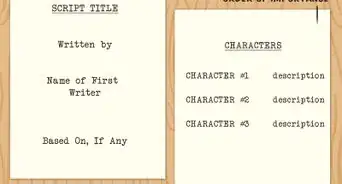wikiHow is a “wiki,” similar to Wikipedia, which means that many of our articles are co-written by multiple authors. To create this article, 26 people, some anonymous, worked to edit and improve it over time.
There are 7 references cited in this article, which can be found at the bottom of the page.
wikiHow marks an article as reader-approved once it receives enough positive feedback. In this case, 82% of readers who voted found the article helpful, earning it our reader-approved status.
This article has been viewed 83,233 times.
Learn more...
Musical theatre is a great extra curricular for college applications and is getting more and more popular with men, women, boys, and girls alike. Whether you want to perform in high school, community, or professional musical productions, there are steps you need to take. Take lessons. Prepare yourself for auditions. And then get out there, do your best, and have fun.
Steps
Training Properly
-
1Start with some lessons. Musical theatre involves singing, acting, and dancing. If you have trouble with any of these areas, look into lessons in your local area. Teachers post ads in places like newspapers and local magazines. These lessons can also be put on your resume. This will help you look more experienced.
- Choose to work with people who have succeeded themselves in musical theatre or have taught people that went on to see their names in lights.[1]
-
2Practice a lot. Even after you’ve finished your formal training, you’ll need to keep practicing, learning new skills, and remaining limber. Sing new songs. Learn new dances. Join community musical productions. They’ll be great experience. You can use these experiences to try out new skills.Advertisement
-
3Get in shape. In many musical theatre performances, you’ll need to move around a lot, either on stage or off stage. You might be dancing choreographed masterpieces. No matter what, you need to be in shape. Do a lot of cardio exercises like running, jump roping, and swimming. It is important to have a lot of stamina to both move and sing at the same time.[2]
-
4Cultivate a community of musical performers. It is so important to join other aspiring actors, singers, and dancers. Not only will you pick up advice on your craft, but you can rely on one another to hear about auditions. They will be great moral support as well.
Preparing for Auditions
-
1Think strategically about your audition materials. Try to match the style of your audition piece to the style of the musical you're auditioning for. There are different kinds of musicals. For example, RENT is a rock musical. If you were auditioning for RENT, you would not want to sing a classical ballad or a country song. Keep with the theme. Sing something from Jesus Christ Superstar or The Rocky Horror Picture Show.
- Never audition with a piece from a show that the company has done in the past 5 years. They'll compare you with whoever did it in their production. They are working on something new and don’t want to just replicate a past performer.
- When auditioning, try to avoid songs that have been over sung, are too well known, or are too complex. You don’t want to be perceived as a novice. People in the theatre want performers that have an in-depth knowledge of theatre.
- Some commonly overdone songs are "Tomorrow" or "Maybe" from Annie, "Memory" from Cats, "Favorite Things" from The Sound of Music, any songs from Wicked, Phantom of the Opera or Les Miserables,"Somewhere Over the Rainbow" from The Wizard of Oz, "Don't Rain on my Parade" from Funny Girl, "Shy" from Once Upon a Mattress, "I Enjoy Being a Girl" from Flower Drum Song, "Seasons of Love" from RENT, or "In My Own Little Corner" from Cinderella.
- Disney films are great but not for auditions. Avoid using songs from Disney films.
- Do not sing anything made famous by a well known Broadway artist ("Taylor the Latte Boy" being a perfect example)
- Think carefully about a piece involving extensive profanity or innuendo.
-
2Prepare a monologue. Musicals aren’t all about music. In most musicals, you’ll have to go back and forth between singing and acting. Be prepared to show both skills. Don’t choose monologues that have been overdone. Producers, directors, and casting crew enjoy being surprised by monologue choices. If you choose a common one, they may not pay close attention to your prepared piece.[3]
- Keep your monologue to under 2 minutes long. You want to be able to show a range of emotions in a short amount of time. The casting crew will be viewing dozens of people for this part and others. If they want something longer, they’ll ask for it.
- Choose a monologue from a play or a movie. Most monologues in musicals are used to set up songs, so they normally aren’t as developed as ones in plays or movies.
- Avoid monologues with really obscene language or gestures, thick accents, or too much movement. You want to emphasize your acting chops, not your ability to offend. Exceptions exist. You’ll want to gauge the tone of the musical you are auditioning for when prepping. If it is a raunchy musical, an unconventional and crass monologue may be a good choice.
-
3Practice dancing. If there is a dancing portion of the musical, the audition will be run like a class. They’ll teach you the dance and then ask you to perform it. Regardless, you should practice a variety of dances. Learn new dances frequently. You’ll get better at learning dances quickly.
-
4Film yourself. Put your audition monologue and songs on tape before you audition. Then watch them. Just like athletes, you'll want to watch your performance, analyze it, and fix any errors or odd transitions. Look for strange body language, facial expressions, or speech abnormalities.
- In your audition pieces, make sure you have an equal balance of facial expressions, hand gestures, and movement. It's great that you're using your hands to tell the story, but it won't impress anyone if your face looks like you're falling asleep. Keep every part of your body alert and in control.
Going Out for the Part
-
1Find and schedule an audition. You should always book an audition time unless otherwise specified. Most contact information for booking auditions will be either on the company's website or in a newspaper advertisement.[4]
-
2Dress the part. Dress nicely for your audition. How you present yourself is key. It is generally regarded as very unprofessional to wear a costume. However, you may wish to wear an outfit that resembles something that your character would wear. Help the casting crew to see you in the role, but don’t go so over the top that your clothing takes away from your performance. Stay away from props.
-
3Prepare your song, monologue, and dance. Most groups will tell you what they want you to do for the audition. Generally, they'll want a song that fits your voice range and age (always from a musical), and a short 1 or 2 minute monologue.
-
4Audition. Auditioning can be a nerve-racking experience for the first few times. There are different kinds of auditions.
- There are open auditions. This is where you audition for everyone - the director, the music director, any other board members, and the other people auditioning.
- There is also a closed audition where you are only auditioning for the director, and the music director.
-
5Brace yourself for “rejection”. Every position is different and the director/producer have a specific image in mind. Go in. Do your best. If you don’t get it, most likely it isn’t anything you did.
-
6Show up with a smile on your face and your best foot forward. Be polite. Don’t be arrogant. Make good impressions. Just watch what you say and who you say it to. If they like your personality, they may think of you for a different part, perhaps, in a different production.
- Do not get caught up in drama. Trash talking people in the theatre community will get you nowhere but a seat in the audience. Approach your experiences with an open mind and optimistic conscience. It will get you far.
Getting into the Business
-
1Attend a college or conservatory. Especially if you want to make musical theatre your profession, this is necessary. Many people talk about “raw” natural talent. There is no substitute for it, but you still need to refine that talent. Majoring in theatre in college will give you a well-rounded education, which can help you get into musical theatre, but also several other jobs associated with the stage.[5] Conservatories focus on refining specific skills like singing, dancing, acting, and playing instruments.[6]
- While in college or the conservatory, think about what skills will set you apart as a performer. Who knows what skills a producer will want, so it is best to have knowledge of a variety of traditional and non-traditional performing skills. Steve Martin is a comedian, but he often uses a banjo for comedic purposes. If you can play the banjo and you go our for a musical version of Huckleberry Finn (like Roger Miller’s “King of the Road”), you’ll have a heads up on other performers without that skill. It is much easier to play a banjo than to successfully mime playing one.
-
2Make connections. Getting connections is also part of your training. Yes, it's clichéd, but knowing the right people in the right way is important. Get an idea of who's a big deal and who's not. Then attend shows and after parties where those people are bound to be. Play it cool. Complement their shows. Highlight what you have in common or how you might be able to help them. Overtime, these connections can result in more auditions and jobs.
-
3Create a resume and portfolio. Like any job, having a well laid out, detailed resume will make you look more professional.
- Start with your name and basic information such as your phone number, email, address, and date of birth. You may also wish to include your vocal range (e.g. Soprano, Alto, Tenor, Bass) in this section.
- Next, include a list of what previous productions you've been in. This format should include the name of the production, the company that put it on, where and when it was, and what your role in the production was. Next you should include any training you've done or relevant extra-curricular activities such as vocal lessons, dance lessons, acting lessons, gymnastics, and instruments you play. You will need to also put who your teacher was or the company you did it with.
- Think about your digital presence also. Include your Twitter handle, Facebook name, and personal website (if you have one). With so many personalities and musicians hitting it big on Youtube, producers pay close attention to the online presence of their performers. If you have a big following online too that could translate into more theatre goers, producers may be further intrigued by you.[7]
-
4Get an agent. Most people think that agents only deal with big Hollywood stars. This isn't true. Agents are paid to be in the loop and to have connections. While you can develop these connections over time socially, it might pay to expedite the process. Agents can get you into more auditions. They can help get you more exposure as well, which might translate to musical theatre jobs down the line. [8]
- When getting an agent, pay attention to whom they've worked with. Make sure that they aren't just going to take your money and not work for you.
-
5Serve your time in the trenches. Whether you're looking for your big break or your first lead role, you have to wait to get it. It takes a couple of shows before you finally begin to get recognized by people in the theatre community. If you wait and are patient, not only will you have a larger resumé, but you'll be a better actor/actress for it!
Community Q&A
-
QuestionHow do I get into child roles?
 Community AnswerIn low-cost (amateur shows) auditions will be advertised through Facebook, banners, etc. They are easy to get into as they are always produced by one of your local theatre groups. However, if you are talking about big-cost (professional/Broadway/West End) shows, then you will need to have a demonstrable experience in acting. You can't have been in one low-cost show and then expect to be In a West End production. You need to practice hard for at least five or so years or show exceptional talent or be exactly what the producers are looking for.
Community AnswerIn low-cost (amateur shows) auditions will be advertised through Facebook, banners, etc. They are easy to get into as they are always produced by one of your local theatre groups. However, if you are talking about big-cost (professional/Broadway/West End) shows, then you will need to have a demonstrable experience in acting. You can't have been in one low-cost show and then expect to be In a West End production. You need to practice hard for at least five or so years or show exceptional talent or be exactly what the producers are looking for. -
QuestionWould getting an apprenticeship or internship backstage would help?
 Community AnswerIt depends on what you in theatre you want. If you want to work backstage, working the sound, scene changes, and lights, then this would be a great idea. If you are looking to be on stage and performing, then this may not really help. Consider enrolling in some acting classes at your local college, and getting your experience in a community theatre instead. If you wish to sing, then it might be a good idea to get a voice coach as well.
Community AnswerIt depends on what you in theatre you want. If you want to work backstage, working the sound, scene changes, and lights, then this would be a great idea. If you are looking to be on stage and performing, then this may not really help. Consider enrolling in some acting classes at your local college, and getting your experience in a community theatre instead. If you wish to sing, then it might be a good idea to get a voice coach as well. -
QuestionI'm performing in a play and I have to sing a lot in my role. How can I increase my endurance?
 Community AnswerYou can do some cardio exercise to increase your stamina. Other than that, drink plenty of water and do regular vocal exercises to keep your voice in shape. Of course, don't forget to practice the actual pieces you'll be singing, along with any choreography that might go along with them.
Community AnswerYou can do some cardio exercise to increase your stamina. Other than that, drink plenty of water and do regular vocal exercises to keep your voice in shape. Of course, don't forget to practice the actual pieces you'll be singing, along with any choreography that might go along with them.
References
- ↑ https://www.nyfa.edu/student-resources/tips-for-breaking-into-musical-theatre/
- ↑ http://newmusicaltheatre.com/greenroom/2014/09/whipped-into-shape-body-training-for-mts/
- ↑ http://auditioningforcollege.com/musical-theatre/rep/do-not-lists-overdone-songs-and-monologues/
- ↑ http://www.playbill.com/jobs/find
- ↑ http://talk.collegeconfidential.com/musical-theater-major/
- ↑ http://musicschoolcentral.com/discover-the-10-best-colleges-for-musical-theater/3/
- ↑ https://www.nyfa.edu/student-resources/tips-for-breaking-into-musical-theatre/
- ↑ http://www.backstage.com/resources/search/agent/
About This Article
To get into musical theater, try to practice singing, acting, and dancing as much as possible. You should also teach yourself songs and dances outside your normal range so you have more flexibility in the roles you can play. In addition to practicing, audition for as many productions as you can, which will help you gain experience and improve your acting and singing skills. To learn how to nail an audition for a musical theater production, scroll down!















































































